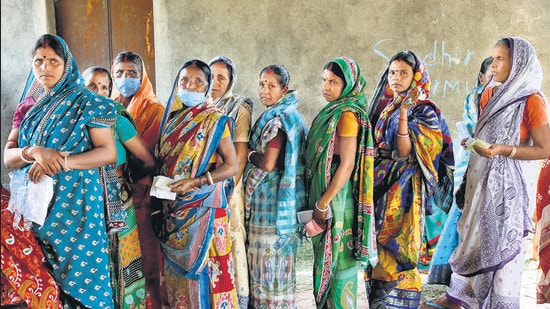Seeking support, denying representation
f parties want the support of women voters, then they owe it to women to create enabling conditions for them to progress through the political system and have a say in political decision-making
In West Bengal, the Trinamool Congress (TMC) and the Bharatiya Janata Party (BJP) have announced impressive schemes for women in the hope of wooing the silent woman vote. Chief Minister Mamata Banerjee has cast herself in the role of Bengal’s daughter doughtily taking on an interloper. But despite the rhetoric, women’s representation remains well below what is fair and equitable. With 17% women candidates, the TMC has done well in giving women more representation than others, but gender parity is still a long way off.

The case of Kerala, a consistent top performer in development indices, is disappointing. The lists announced by the three major fronts — led by the Left, the Congress and the BJP — feature just 40 women out of 420 candidates, an abysmal nine per cent. Over decades, women have been assiduously kept out of the higher reaches of Kerala politics. There have only been eight women ministers ever in Kerala. Many will recall legendary leaders such as KR Gowri and Susheela Gopalan being sidelined by the Left Front even though they were hugely popular and were star campaigners.
The same is true for Tamil Nadu, where all parties are offering substantial sops to attract women voters, but have been tardy when it comes to improving their position in the political decision-making apparatus. The All India Dravida Munnetra Kazhagam (AIADMK), which is in alliance with the BJP, has promised ₹1,500 to one woman in every household if voted to power, free washing machines, free gas cylinders, Amma patrol teams; other parties too have weighed in with promises of salaries for household work and special police units to investigate crimes against women. But in total, the two major alliances in the state have put up less than 13% women candidates. According to Election Commission data, since 1967, on an average, less than five per cent of Tamil Nadu’s MLAs have been women.
Yet, the scenario at the local government level is very different in all these states, especially Kerala and Tamil Nadu, where women are coming to the fore and bridging the gender gap. Part of the reason is reservations, but affirmative action ends at that level. Beyond that, women encounter structural and discriminatory barriers; they are denied tickets, primarily on the ground that they supposedly lack the winnability factor. The fact that the AIADMK had a woman leader, or that the Congress continues to have strong women leaders, has made little difference.
Sops such as washing machines may make life easier temporarily for women. But the patriarchal attitude is visible in the language of many leaders during the campaign — when they speak of the safety of daughters, mothers and wives as though these are the only identities a woman has.
If parties want the support of women voters, then they owe it to women to create enabling conditions for them to progress through the political system and have a say in political decision-making. This can easily be done by identifying women at the local level who have done well, and throwing the party’s resources and weight behind them.
India’s major parties seem to be able to organise party cadres to work for relatively untested male candidates, with ease. Surely, this can then be done for women who have worked at the grassroots instead of fobbing them off with patriarchal condescension and getting the women’s vote through freebies. This should be on the agenda of all enlightened parties. Perhaps, next time around.
lalita.panicker@hindustantimes.com
The views expressed are personal



